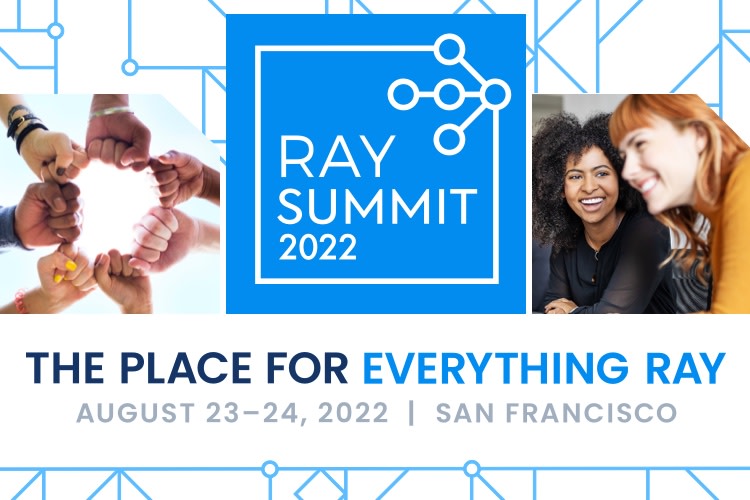
7 must-attend Ray Summit sessions: RL-powered traffic control, infra-less ML, and more
By Jules S. Damji and Ben Lorica | June 1, 2022

Ray Summit is where the Ray community comes together to build, learn, and explore everything AI and more on Ray. This year, for the first in-person Ray Summit, we have a fantastic program of keynotes, breakout sessions, lightning talks, and meetup talks covering everything from developer deep dives and Ray use cases across industries to Ray in production for reinforcement learning and building scalable machine learning platforms — all to enable myriad use cases for ML practitioners.
Here are just a few of the sessions we’re looking forward to attending this year:
Gearing up for FIFA 2022 using RLlib-powered traffic control: The World Cup is a massive month-long football event that demands precise human and vehicle traffic control and coordination to and from stadiums. Ji Lucas and Mayuresh Kunjir, both from Qatar Computing Research Institute, will share how they built a multi-agent reinforcement learning framework based on RLlib to design a coordinated traffic light control policy system to control congestion and facilitate mobility.
How Spotify sped up ML research and prototyping with Ray: If you’re a fan of the Spotify mobile app, perhaps you’d be interested in the tech infrastructure that powers it. Spotify ML Platform engineers Keshi Dai and David Xia will reveal their journey with Ray: how they integrated their internal ML infrastructure on top of Ray, what specific use cases Ray integration enabled, and best practices gleaned along the way.
Predibase: A low-code deep learning platform built for scale: Travis Addair, chief technology officer at Predibase, will share a new kind of low-code machine learning platform, combining large-scale deep learning with state-of-the-art model architectures across a range of modalities, including NLP, computer vision, tabular, and hybrid data. He’ll explore how Ray provides a serverless abstraction to enable scaling.
Zero-copy model loading with Ray and PyTorch: The cost of large ML model loading and serving can be prohibitive, but there are ways to reduce the costs. Fred Reiss, a principal staff member at IBM Research, will show how to reduce this cost to almost zero by leveraging features in PyTorch and Ray. In particular, he’ll explain how to employ Ray’s distributed shared memory to store large deep learning model weights so that any process with access to the shared memory segment can load it instantaneously.
SkyML: Infra-less machine learning on any cloud: SkyML is a project being developed at UC Berkeley's Sky Computing Lab for "infra-less" machine learning on any cloud. The SkyML platform abstracts away the cloud and infrastructure on which ML applications run.
Large-scale deep learning to augment production RL workloads: Riot Games has been using deep reinforcement learning to build bots that can play games at various skill levels in order to provide additional feedback to game designers. This talk describes how they use Ray Data, Ray Train, and Ray Tune to build a supervised learning model to control and tune game servers utilized by bots that are learning to play the game.
A serverless resilient graph analysis platform built on Ray: This talk introduces ByteGAP, an enterprise-level Graph Analytics Platform for graph computing and graph mining. ByteGAP is used to process extremely large graphs such as those found in the popular social media applications Douyin and TikTok. ByteGAP is built on top of KubeRay to provide flexible resource management, automatic cloud deployment, scalability, and fault tolerance.
That’s just the beginning of what we have in store at this year’s Ray Summit. Over the two days of the conference, we’ll learn how companies like ByteDance, Shopify, Uber, IBM, and more are building cutting-edge ML platforms and applications on Ray. We’ll hear keynotes from AI and ML luminaries like Greg Brockman, co-founder of OpenAI, and Soumith Chintala, creator of PyTorch. And, since it’s the first time many community members are getting together in person, we’ll also have some fun during our community happy hour and Ray Summit meetup.
Register now — early bird registration is open until June 17.

